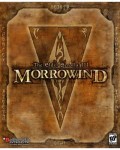Lost Classics: Morrowind (PC, Xbox)
by William Talley, filed in Games, Lost Classics on Jul.04, 2010
 To call the third entry in Bethsheda’s Elder Scrolls series a fantasy Grand Theft Auto would be a serious understatement. While progression in the GTA games is tied to the plot, there is seemingly no limit to what could be done in Morrowind. While there was a story, you were not obligated to follow it. You can rise to the head of a guild, level grind yourself into a tank or an ultra-mage, or just plunder for treasure all day. You can even become a vampire or werewolf and spend your nights stalking victims. If it wasn’t for the combat system, it would most likely have become one of the PC’s top titles as well as an Xbox system seller.
To call the third entry in Bethsheda’s Elder Scrolls series a fantasy Grand Theft Auto would be a serious understatement. While progression in the GTA games is tied to the plot, there is seemingly no limit to what could be done in Morrowind. While there was a story, you were not obligated to follow it. You can rise to the head of a guild, level grind yourself into a tank or an ultra-mage, or just plunder for treasure all day. You can even become a vampire or werewolf and spend your nights stalking victims. If it wasn’t for the combat system, it would most likely have become one of the PC’s top titles as well as an Xbox system seller.
As in true Elder Scrolls fashion, you play as a prisoner (whom you create yourself) whose release has just been ordered by the emperor. No one knows why you were in prision in the first place (beside you) or why you were freed. After filling out the paperwork, you are given instructions to head to the city of Balmora and speak with someone there. However, weather or not you choose to do so is completely up to you. Your journey will take you across a huge land and you’ll meet lots of people. There are several skills you can level your characters in, and the key is to find the right combination which works best for you.
If there was one major issue I have with the game, it’s the combat system. I’m not a huge fan of turn-based combat in real time games, especially here where it looks jerky and awkward. It also tends to get tedious having to walk so many miles across the land, as there are few options for fast travel. Thankfully these issues were addressed and corrected in the sequel, Oblivion. Even with these issues, Morrowind is to this day an expansive and engrossing game. If you give it a chance, you will find that it is easy to get lost in it.


 PS3
PS3
 Famicom Dojo
Famicom Dojo KEEP PLAYING
KEEP PLAYING KEEP PLAYING: Rewind
KEEP PLAYING: Rewind Powet Toys
Powet Toys Powetcast
Powetcast Hitchhiker's Guide POWETcast
Hitchhiker's Guide POWETcast














